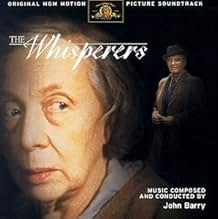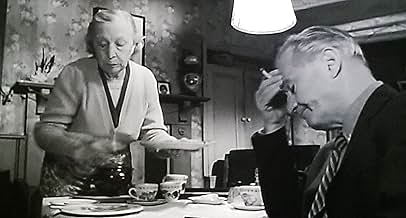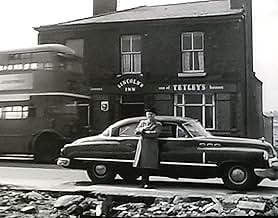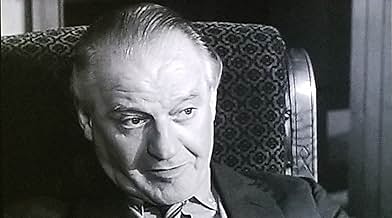CALIFICACIÓN DE IMDb
7.1/10
1.6 k
TU CALIFICACIÓN
Agrega una trama en tu idiomaA lonely elderly Englishwoman talks to herself and hears voices talking about her.A lonely elderly Englishwoman talks to herself and hears voices talking about her.A lonely elderly Englishwoman talks to herself and hears voices talking about her.
- Dirección
- Guionistas
- Elenco
- Nominado a 1 premio Óscar
- 9 premios ganados y 4 nominaciones en total
- Dirección
- Guionistas
- Todo el elenco y el equipo
- Producción, taquilla y más en IMDbPro
Opiniones destacadas
Dame Edith Evans, one of the British theater's greatest actresses of the first half of the twentieth century, gives a brilliant performance as a lonely old lady existing in seedy rented rooms in a grimy industrial town while scraping by on National Assistance. This film should be shown to everyone on their first day of work, before they fill out their tax deferred pension withholdings. If ever there was a good lesson for putting something away for one's old age, it is this film. It is a horror story of "This is what's going to happen to you if you don't start putting something aside for your old age."
Mrs. Ross lives alone in poverty despite a family of sorts, a work-shy husband who deserted her and a son who only comes by to hide stolen loot while pretending to visit. Her rooms are a disorderly clutter of books, old newspapers, glass bottles and anything she doesn't want to throw away. Her endless days are filled with visits to the local library reading room, to keep warm; the local mission church; the police station, to complain about the neighbors; and the social security office, to beg for more public assistance; which is doled out a few shillings at a time.
To escape this grim reality Mrs. Ross builds a fantasy world not unlike Luis in "Kiss of the Spider Woman". She exists in her fantasy of a privileged upbringing as the daughter of a Bishop, living in a palace, and watching the white gloved dancers at a ball. She awaits the settling of her fantasy father's estate and the fortune from the family cattle business. When she finds stolen money hidden by her shiftless son during a quick visit, she believes that her ship has finally come home and her fantasies are reality. It is not long before the vulnerable old lady is "befriended" and robbed by a steely eyed con woman, and dumped in an alley near her home. Although the welfare people do all they can to get her back on her feet and her husband to take care of her, by the film's end she has come full circle and has resumed her daily routine and her fantasy world.
Dame Edith, who was the original "St. Joan" on stage in the 1920's, and for whom Shaw wrote "The Millionairess" is rarely off the screen and gives a faultless performance in what could otherwise be a very depressing film about poverty and loneliness. Where at first you sympathise with the old lady who has come down in the world and is now living in genteel poverty, you come to understand that she never went up in the first place, the only genteel world she ever inhabited was in her mind, and that is where she now resides.
As for an acting tour de force, just watching the way Dame Edith conveys the lowly origins of Mrs. Ross without words, as in the way she eats - out of tins - lifting large slices of bread to her mouth (where they fall apart) rather than cutting the slice to small manageable portions, licking her fingers, reading at the table - all the things considered to be bad manners. The way she conveys old tired poverty, by slipping off her shoes in the library to warm her feet on the hot pipes, is a lesson in technique that all aspiring actors should take note of. You know as you watch her slowly make her way down the cobbled streets carrying her large tote bag that this pathetic old lady is a prime target for a mugging, or a slip and fall. I would recommend this film to anyone who wants to study great acting and to those who are concerned with the plight of the elderly.
Mrs. Ross lives alone in poverty despite a family of sorts, a work-shy husband who deserted her and a son who only comes by to hide stolen loot while pretending to visit. Her rooms are a disorderly clutter of books, old newspapers, glass bottles and anything she doesn't want to throw away. Her endless days are filled with visits to the local library reading room, to keep warm; the local mission church; the police station, to complain about the neighbors; and the social security office, to beg for more public assistance; which is doled out a few shillings at a time.
To escape this grim reality Mrs. Ross builds a fantasy world not unlike Luis in "Kiss of the Spider Woman". She exists in her fantasy of a privileged upbringing as the daughter of a Bishop, living in a palace, and watching the white gloved dancers at a ball. She awaits the settling of her fantasy father's estate and the fortune from the family cattle business. When she finds stolen money hidden by her shiftless son during a quick visit, she believes that her ship has finally come home and her fantasies are reality. It is not long before the vulnerable old lady is "befriended" and robbed by a steely eyed con woman, and dumped in an alley near her home. Although the welfare people do all they can to get her back on her feet and her husband to take care of her, by the film's end she has come full circle and has resumed her daily routine and her fantasy world.
Dame Edith, who was the original "St. Joan" on stage in the 1920's, and for whom Shaw wrote "The Millionairess" is rarely off the screen and gives a faultless performance in what could otherwise be a very depressing film about poverty and loneliness. Where at first you sympathise with the old lady who has come down in the world and is now living in genteel poverty, you come to understand that she never went up in the first place, the only genteel world she ever inhabited was in her mind, and that is where she now resides.
As for an acting tour de force, just watching the way Dame Edith conveys the lowly origins of Mrs. Ross without words, as in the way she eats - out of tins - lifting large slices of bread to her mouth (where they fall apart) rather than cutting the slice to small manageable portions, licking her fingers, reading at the table - all the things considered to be bad manners. The way she conveys old tired poverty, by slipping off her shoes in the library to warm her feet on the hot pipes, is a lesson in technique that all aspiring actors should take note of. You know as you watch her slowly make her way down the cobbled streets carrying her large tote bag that this pathetic old lady is a prime target for a mugging, or a slip and fall. I would recommend this film to anyone who wants to study great acting and to those who are concerned with the plight of the elderly.
The supremely versatile film-maker, Bryan Forbes directs a remarkably bleak and eerily unsettling treatise on the multifarious cruelties inherent with old age. 'The Whisperers' (1967) remains a forceful, extraordinarily persuasive work of melancholic cinema that has lost none of its considerable power to enthral and perturb with equally forceful cinematic rigour! It would be greatly remiss of me if I failed to praise maestro, John Barry's truly magnificent score!
No small admirer of, Brian Forbes's dazzlingly ecclectic cinema, I passionately believe that 'The Whisperers' remains one of his finest films. Exquisitely shot, with exemplary performances, the magisterial, Edith Evans on positively mesmeric form, movingly delivering one of cinema's most genuinely affecting performances. It is tantamount to a cultural travesty that this monochrome masterpiece has long been allowed to mildew away in undeserved obscurity. 'The Whisperers', along with the equally unsettling existential nightmare 'Séance on a Wet Afternoon' are arguably two of the more compelling dramas produced during the UK's dynamic Renaissance of the 1960s. Hopefully some tasteful, forward-thinking celluloid archivist might soon release this exceptionally fine film on a restored, features-packed Blu-ray!
No small admirer of, Brian Forbes's dazzlingly ecclectic cinema, I passionately believe that 'The Whisperers' remains one of his finest films. Exquisitely shot, with exemplary performances, the magisterial, Edith Evans on positively mesmeric form, movingly delivering one of cinema's most genuinely affecting performances. It is tantamount to a cultural travesty that this monochrome masterpiece has long been allowed to mildew away in undeserved obscurity. 'The Whisperers', along with the equally unsettling existential nightmare 'Séance on a Wet Afternoon' are arguably two of the more compelling dramas produced during the UK's dynamic Renaissance of the 1960s. Hopefully some tasteful, forward-thinking celluloid archivist might soon release this exceptionally fine film on a restored, features-packed Blu-ray!
"The Whisperers" is the kind of movie you curl up with on a rainy day. I had the fortune of catching it on Turner Classic Movies once and I was mesmerized. Edith Evans gives a completely convincing performance as a lonely old woman living in a run down apartment (or flat) in London. Clearly, she is bordering on senility or dementia as she imagines voices coming from faucets, her radio, and suspects her neighbors are spying on her. She imagines herself an heiress (as she frequently reminds her social worker at the Public Assistance Board) waiting for her inheritance to come through. It is sad to see her begging for a new pair of shoes or a pound to get food. Before the film ends, you will find yourself concerned for her well being as though she is a real person. Perhaps it is the realization that many old people the world over live this very existence. I had the good fortune to find this movie available on video through Movies Unlimited. Act fast as it is out of print. Perhaps it will be available on DVD in the future.
This may be the bleakest of all the 'kitchen sink' movies, (it is unremittingly gloomy) and Bryan Forbes' picture of the British Welfare State in the 1960's has an almost Dickensian feel to it. But then Forbes always seemed to work better with subjects which didn't lend themselves to levity.
It's the story of Mrs Ross, a pensioner living on her own and beset by the voices one hears when one is so lonely and in the part Edith Evans is quite magnificent. If you think Evans too patrician for the part of an old woman living in a working class district of an industrial, mostly derelict and rain-sodden city, she does point out that 'she married beneath her' and since she is hardly ever off the screen this is a real tour-de-force, (and she was nominated for the Oscar for it as well as winning a whole slew of other awards). There are also first-rate supporting performances from the wonderful Avis Bunnage and the always consistently reliable Gerald Sim and Eric Portman, terrific as her errand husband). Unfortunately the film's sub-plots involving stolen money and some gangsters seems superfluous and gives the film a somewhat melodramatic air and its down-beat mood meant it was never a popular success and it is hardly ever revived. But seek it out, all the same; it is certainly worth seeing.
It's the story of Mrs Ross, a pensioner living on her own and beset by the voices one hears when one is so lonely and in the part Edith Evans is quite magnificent. If you think Evans too patrician for the part of an old woman living in a working class district of an industrial, mostly derelict and rain-sodden city, she does point out that 'she married beneath her' and since she is hardly ever off the screen this is a real tour-de-force, (and she was nominated for the Oscar for it as well as winning a whole slew of other awards). There are also first-rate supporting performances from the wonderful Avis Bunnage and the always consistently reliable Gerald Sim and Eric Portman, terrific as her errand husband). Unfortunately the film's sub-plots involving stolen money and some gangsters seems superfluous and gives the film a somewhat melodramatic air and its down-beat mood meant it was never a popular success and it is hardly ever revived. But seek it out, all the same; it is certainly worth seeing.
this is a great performance another example of the academy awards not giving it to the rightful owner...i love kate hepburn but lets face it THIS performance deserved it...this is one of thoses performances that you are so grateful that film can perserve...edith evans is so great and yet so sad in the starring role... it is a most depressing film and one that is not to be seen if one is depressed but for an actor to see a great actress in her glory this is one of those experiences indeed...i always admired edith evans but never more than in this picture..of aging and how awful it can be to anyone so treat yourself to an unusual experience and see the whispers...
¿Sabías que…?
- TriviaThe director Bryan Forbes and Nanette Newman, who played the upstairs neighbor, were husband and wife.
- ErroresThe old kitchen curtain is shown in scene after Archie leaves, while Margaret is moping around the apartment. The new curtains are shown again after she returns from seeing Mr. Conrad at the National Assistance Board.
- Citas
Archie Ross: What kind of job might it be, sir?
Mr. Conrad: Doorman at a cinema.
Archie Ross: Oh, wonderful. Nice and healthy and in the open.
Mr. Conrad: The healthiest jobs, Mr. Ross, are the ones you keep.
- ConexionesVersion of ITV Play of the Week: The Whisperers (1961)
- Bandas sonorasShall We Gather at the River?
(uncredited)
Written by Robert Lowry
Performed by Edith Evans and mission attendees
Selecciones populares
Inicia sesión para calificar y agrega a la lista de videos para obtener recomendaciones personalizadas
- How long is The Whisperers?Con tecnología de Alexa
Detalles
- Tiempo de ejecución1 hora 46 minutos
- Color
- Mezcla de sonido
- Relación de aspecto
- 1.66 : 1
Contribuir a esta página
Sugiere una edición o agrega el contenido que falta

Principales brechas de datos
By what name was The Whisperers (1967) officially released in India in English?
Responda































